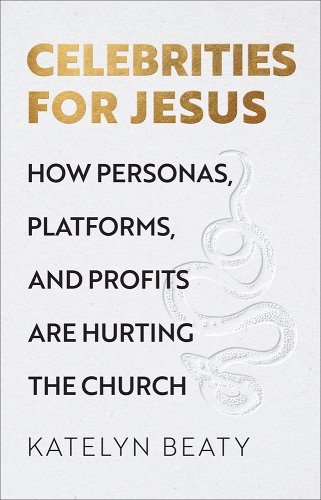 My first encounter with Christian celebrity occurred in 1983, when Tony Campolo preached to a humid Lehigh University gymnasium packed with Mennonite teens. I already knew Campolo’s sermons, having listened to them on tape cassettes my parents played during road trips. Hearing Campolo’s electrifying delivery first-hand ignited me, and I responded to his altar call that night, rededicating my life to Jesus and to the work of justice about which Campolo spoke.
My first encounter with Christian celebrity occurred in 1983, when Tony Campolo preached to a humid Lehigh University gymnasium packed with Mennonite teens. I already knew Campolo’s sermons, having listened to them on tape cassettes my parents played during road trips. Hearing Campolo’s electrifying delivery first-hand ignited me, and I responded to his altar call that night, rededicating my life to Jesus and to the work of justice about which Campolo spoke.
Campolo’s relative fame as an evangelical pastor in the 1980s and ’90s seems far removed from the kind of Christian celebrity Katelyn Beaty explores in her excellent new book, Celebrities for Jesus: How Personas, Platforms, and Profits are Hurting the Church (Brazos Press). While Campolo spent several decades preaching for social change, and in an age before social media could amplify his message, Christian leaders chasing fame today have “cultivated an image of spiritual importance,” Beaty writes, focused more on their brand and the accoutrements of wealth and power than on a message of peace, justice, and equity. They have also “been allowed to evade normal accountability,” Beaty says, acting in ways that are anathema to the Gospels.
Instead of calling Jesus’s followers to act more justly in the world, and to disrupt corrosive power, today’s Christian celebrities are much more likely to focus their significant resources on platform building, constructing an edifice to promote their individual image. Beaty claims that Christian celebrities might be preaching the good news–they might even be sincere in the good news they’re delivering. But our contemporary fascination with celebrity, and with Christian celebrity in particular, means Christian institutions serve an individual “brand,” rather than having an individual who serves an institution, be that a church, a nonprofit, or a Christian publishing house.
“Institutions are too often platforms for self-expression rather than arenas of deep moral formation,” Beaty notes. Structures that lack the extensive frameworks of deep moral formation and accountability prop up charismatic leaders whose platforms might do some good in the world but whose behavior can also cause significant damage to other humans. Beaty traces this dynamic in the work of Ravi Zacharias, whose preaching and writing reached millions, but who used his power and prestige to abuse women. Before his death in 2020, Zacharias remained shielded from abuse claims because he was a beloved Christian leader, presumably beyond reproach. Beaty, who worked at Christianity Today as a managing editor and reported on the famous evangelist’s ministry, admitted that she “failed to seek the truth earlier” about Zacharias, trusting his public persona rather than the disturbing rumors that reflected a much different private life.
Beaty’s incisive analysis considers the many scandals that have rocked white evangelical leaders in the last few years, noting how the allure of celebrity can cause significant damage to the Christian witness. One need only look at Mark Driscoll’s rise and fall (and rise) to power to see this play out. Beaty spends ample space considering Driscoll’s ministry, and the ways his celebrity power was a not-so-firm foundation for an extensive Mars Hill Church network which ended up crumbling when its leader fell. That Driscoll has found a new following reflects the deficits in a celebrity economy that platforms charismatic leaders without accounting for the considerable damage they’ve caused.
To her credit, Christian publishing is not spared in Beaty’s analysis, even though Beaty has spent her professional life working in this industry, as a writer and editor at Christianity Today, and now, as an acquisition editor at Brazos Press. Despite her commitment to Christian publishing, she “can’t genuinely encourage people” to enter the field. When Christian publishers insist their writers must have platforms–be that an extensive following on social media or an expansive public persona–they add “jet fuel to the problem of Christian celebrity,” Beaty writes. Already existing power structures are reified by this platforming, and marginalized voices are far less likely to find traction in an industry that privileges writers who are primarily white and male, and are able to attract readers not necessarily because of their compelling ideas but because their charisma and appearance and fame make them seem worthy of our attention.
Far from cultivating justice, the culture of Christian celebrity has perpetuated systems of inequity, eroding an already fragile evangelical witness. As church membership continues to decline in the United States, Beaty argues, too many Christians are putting false hope in the draw of celebrity: either in celebrity preachers like Driscoll, or Carl Lentz at Hillsong, or Bill Hybels at Willow Creek; or in popular figures like Justin Bieber and Kanye West, whose professions of faith have been lauded, their public personas presented as worthy of emulation.
Beaty compellingly describes a far more relational, far more powerful way churches should remain relevant: not by chasing platforms that are ephemeral, but through the quiet, often hidden, ministry of relationship. She asserts that the American church needs to recalibrate its focus, away from “the trappings of size, spectacle, and sensationalism to a life of ordinary faithfulness in our individual and corporate lives.”
Celebrities for Jesus ends by calling readers to account, reminding them that their faith development was no doubt built more on friendship than fandom. As I recall my own early brush with Christian celebrity, I can see that Tony Campolo might have ignited my passion for a faith grounded in social justice. But that fire was readied by my parents and my Sunday school teachers. In the decades since I heard Campolo speak, that passion was not sustained by listening to Campolo’s cassettes (or the present-day equivalent), but by a college professor, whose life reflected her deep love for Jesus; and Sister Michelle, a feisty nun who supervised my work at a ministry in Pittsburgh; and my kids, who call me to a humble reckoning with my white privilege each and every day.
Celebrities for Jesus challenges believers to account for the damaging allure of celebrity, affirming that God’s kingdom isn’t built by prestige, a flashy stage, or a million clicks on Instagram. Instead, lives of humble fidelity to Jesus and his teaching will more fruitfully bear witness to God’s presence in the world. Through Beaty’s exploration of Christian celebrity, it’s the significance of this quiet faithfulness that will powerfully resonate with readers.
Melanie Springer Mock is an English professor at George Fox University, Newberg, Ore. Her most recent book, Finding Our Way Forward: When the Children We Love Become Adults, is forthcoming from Herald Press.


